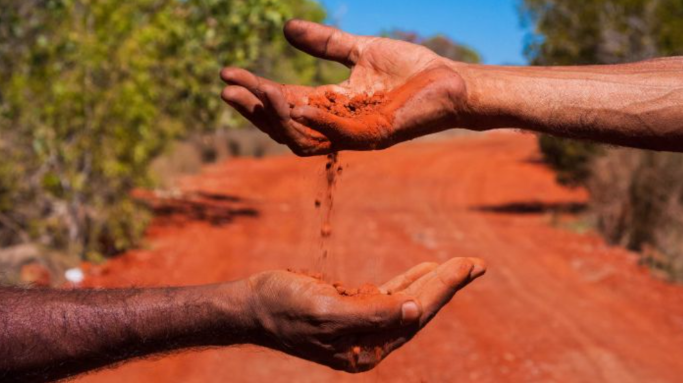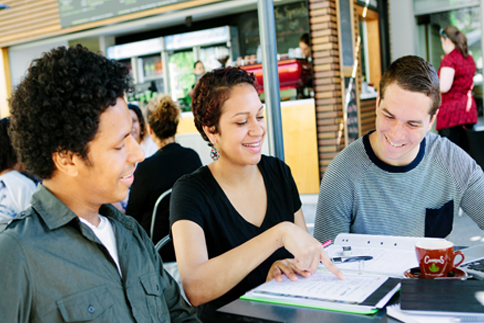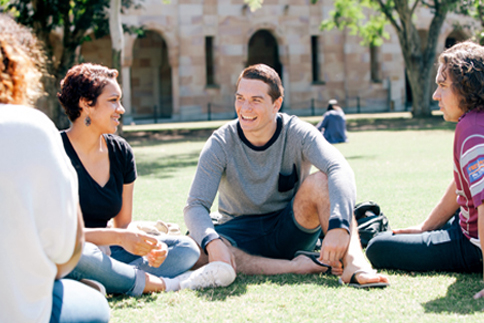Indigenous Engagement
The School acknowledges the Traditional Owners and their custodianship of the lands on which UQ operates.
We pay our respects to their Ancestors and their descendants, who continue cultural and spiritual connections to Country. We recognise their valuable contributions to Australian and global society.
With more than 370 million Indigenous people worldwide and Indigenous politics featuring as a prominent and crucial debate in the Australian polity, the School of Political Science and International Studies is committed to increasing Indigenous engagement. Since 2010 the School has led a range of initiatives from provocative fora such as “How white is your university?” to recent commitments to include more Indigenous issues and perspectives in the curriculum. These efforts now continue as part of UQ’s commitment to reconciliation through its inaugural Reconciliation Action Plan (RAP).
Relevance of Aboriginal Political Concepts
Why we need Aboriginal political philosophy now, more than ever
Aboriginal peoples of Australia have engaged in socio-political ordering for tens of thousands of years. Engagement with their political concepts, ideology and peoples should be a high priority focus for political science. See the following source for Mary Graham and Morgan Brigg’s contribution to this conversation.
1. "Wisdom": Rediscovering Aboriginal political concepts
The oldest living culture on Earth shows how our behaviour during the coronavirus pandemic demonstrates the need to reengage with political concepts in order to find new ways of addressing contemporary global challenges. Read more >
2. “Ethics”: The limits of liberalism
The destruction of ancient rock shelters by Rio Tinto and the scourge of deaths in custody are expressions of how the dominant political order bludgeons Indigenous Australia — they are also signs of the need to embrace Aboriginal ethics. Read more >
3. “Autonomy”: The limits of freedom
Aboriginal understandings of personhood provide ways of recasting understandings of our selves and our responsibilities toward others that respond better to our contemporary global challenges — including climate change. Read more >
4. “Proportionality”: The meaning of justice
 Some Aboriginal political concepts are principles — fundamental truths which can be deployed across multiple intersecting registers; truths that, in turn, gain truthfulness by being confirmed through their recursive embedding in different realms. Proportionality is one such concept. Read more >
Some Aboriginal political concepts are principles — fundamental truths which can be deployed across multiple intersecting registers; truths that, in turn, gain truthfulness by being confirmed through their recursive embedding in different realms. Proportionality is one such concept. Read more >
5. “Country”: Refusing colonial desecration
The nation-building that is necessary for Australia to establish its ethical grounding in this continent implies reconsideration of notions of territory drawn from European-derived political thought. Read more >
6. “Relationalism”: An alternative to sovereignty
Over tens of thousands of years, Aboriginal peoples have evolved a complex, refined, multifaceted system of obligations and dispositions, connecting the prosaic and quotidian with the ethereal and sacred. Read more >
7. “Autonomous regard”: Aboriginal realpolitik in a time of conflict
Aboriginal commitments to the combination of autonomy with regard for diverse others of the cosmos show how two forms of sovereignty can face and navigate each other, even in the conditions of settler-colonialism. Read more >
8: The relationalist ethos for managing survivalism
 Human beings are relational creatures and yet, Aboriginal Australia does more with this human quality than does mainstream Australia. Read more >
Human beings are relational creatures and yet, Aboriginal Australia does more with this human quality than does mainstream Australia. Read more >
9: Human futures and the incomplete Dreaming story of COVID-19
We began this series almost  exactly two years ago with a hopeful observation linking the apparent care people were affording each other by adopting public health measures in the initial stages of the COVID-19 pandemic with ancient Aboriginal ideas of relational obligation. Read more >
exactly two years ago with a hopeful observation linking the apparent care people were affording each other by adopting public health measures in the initial stages of the COVID-19 pandemic with ancient Aboriginal ideas of relational obligation. Read more >
Study with us: Courses in Indigenous Politics

The School offers courses in Indigenous politics at both the undergraduate and postgraduate levels.
At the undergraduate level, the course Indigenous Politics & Policy (POLS2101) traces the political relationship between Indigenous and Non-Indigenous peoples of Australia as an instance of wider global relations among indigenous societies, colonial powers and contemporary national and international regimes and institutions. Students will gain an understanding of government policies and the responses to these practices by Indigenous peoples by critically evaluating the political frameworks and policy responses used to deal with Indigenous-settler relations. This course is part of the Bachelor of Arts in Indigenous Studies.
At the postgraduate level, Indigenous Politics Within and Beyond the State (POLS7190) examines the relationship between Indigenous and mainstream conceptions of political community, sovereignty, power, rights, law, diplomacy, and conflict to question, reflect, and expand upon dominant understandings of (international) politics. The course also helps students to increase their understanding of Indigenous peoples enhance capacities for working across cultural difference.
Indigenous Teaching and Learning

The School is deeply supportive of the University’s commitment to Indigenising Curriculum, embedding Aboriginal and Torres Strait Islander curriculum and inclusive teaching practices in programs. There are many complexities, political dynamics and epistemological challenges in making these important changes. The School has developed a Tip Sheet to assist teaching staff in thinking about some of these dynamics. It includes ideas about how to approach the design of the curricula, how to support students and tutors in the classroom, and how to think about the contribution Indigenous academics might make to our courses. This Tip Sheet has now been incorporated into the UQ Library’s Indigenising Curriculum Resources and ‘Get started with Indigenising Curriculum’ online module.
Dr Morgan Brigg completed a project with UQ’s Institute for Teaching and Learning Innovation on ‘Lateral Pedagogy: Building Cultural Competence and Embedding Indigenous Perspectives and Knowledges in Curricula’. The project lays a foundation for building Indigenous cultural competence and embedding Indigenous perspectives and knowledges in curricula. If you would like to see the report, please contact Dr Morgan Brigg.
Our School is dedicated to fostering a supportive environment. There are a range of university services and resources available to support and improve Indigenous student experiences. Including Scholarships and Financial Support opportunities and the Indigenous Tutorial Assistance and Retention (ITAR) Program.
Artwork on Display
The School has acknowledged its association with prominent artist and Adjunct Professor Fiona Foley through the purchase and display of her ‘OPIUM #5—LABOUR’
The poppies in Fiona’s work reference the Aboriginals Protection and Restriction of the Sale of Opium Act (1897) that strictly controlled Aboriginal people in Queensland, stripping them of many basic rights.
Publications
A number of academics in the School actively publish on Indigenous politics in a range of outlets. Selected publications include:
Graham, M., & Brigg, M. (2024). Indigenous diplomacy for an Australian civilisational ethos? - Australian Institute of International Affairs. Australian Institute of International Affairs.
Hutchison, E., Bleiker, R., Bourne, J., & Hoang, Y. (2024). Decolonising affect: Emotions and the politics of peace. Cooperation and Conflict.
Benson, E., Brigg, M., Hu, K., Maddison, S., Makras, A., Moodie, N., & Strakosch, E. (2023). Mapping the spatial politics of Australian settler colonialism. Political Geography, 102, 102855.
Brigg, M., & Graham, M. (2023). Approaching First Nations diplomacy from the Australian continent. Australian Journal of International Affairs, 77(6), 585–589.
Brigg, M., & Graham, M. (2023). Holding contradictions: toward the lawful carriage of Indigenous diplomacy. Australian Journal of International Affairs, 77(6), 682–692.
Graham, M., & Brigg, M. (2023). Indigenous international relations: old peoples and new pragmatism. Australian Journal of International Affairs, 77(6), 590–599.
Graham, M., & Brigg, M. (2023). Indigenous Public Policy Futures: A manifesto for Relationalist Public Administration. In Moodie, N., Maddison, S. (eds) Public Policy and Indigenous Futures. Indigenous-Settler Relations in Australia and the World, vol 4. Springer, Singapore.
Phillips, A. (2023). Indigenous foreign policy: the challenges of survivalism before and after the era of Western dominance. Australian Journal of International Affairs, 77(6), 637–643.
Weber, M. (2023). Can International Relations (IR) learn? The politics of ‘doing understanding’. Australian Journal of International Affairs, 77(6), 664–669.
Brigg, M., & Walker, P. O. (2022). Indigenous approaches to peace. In Richmond, O.P., Visoka, G. (eds) The Palgrave Encyclopedia of Peace and Conflict Studies. Palgrave Macmillan
Brigg, M., George, N., & Higgins, K. (2022). Making space for Indigenous approaches in the Southwest Pacific? The Spatial Politics of Peace Scholarship and practice. Journal of Intervention and Statebuilding, 16(5), 545–562.
Brown, P.R., Bourne, J., & Brigg, M. (2022). Governance and Indigenous-State Entanglement. Australian Political Science Association (APSA) Annual Conference, Australian National University, ACT, Australia, 26-28 September 2022. Canberra, ACT, Australia.
Fredericks, B., Martin, K., Warner, B., Perkins, R., Combo, T., McConochie, E., Stajic, J., Thomson, A., Holland, L., Olssen, E., Thompson, K., Broderick, T., Gilbert, S., Murphy, L., Lee, N., Beetson, S., Fraser, J., Allan, H., & Bunda, T. (2022). Ready to write. Journal of Australian Indigenous Issues, 25(3–4), 1–10.
Brigg, M., & Murphy, L. (2021). Beyond ‘Structured Inattention’: Towards Australian Indigenous Political Studies? In The Oxford Handbook of Australian Politics (pp. 545–559). Oxford University Press.
Brigg, M., Graham, M., & Weber, M. (2021). Relational Indigenous systems: Aboriginal Australian political ordering and reconfiguring IR. Review of International Studies, 48(5), 891–909.
Brown, P. R., & Warner, S. A. (2021). Is Indigeneity hidden in the shadow of Australian national school reforms? Australian Journal of Social Issues, 57(2), 314–328.
Brigg, M. (2019). Registers of relationality for knowing Indigenous-Settler politics. In Indigenous-settler relations in Australia and the world (pp. 15–31).
Brigg, M., Graham, M., & Murphy, L. (2019). Toward the dialogical study of politics: hunting at the fringes of Australian political science. Australian Journal of Political Science, 54(3), 423–437.
Brown, P. R. (2019). Understanding barriers to new approaches – a case study from Australian remote indigenous policy. Critical Policy Studies, 14(4), 408–425.
Brown, P. R. (2017). Attempting to cultivate mindsets for boundary spanning in remote Indigenous policy. Australian Journal of Public Administration, 76(4), 412–425.
Brigg, M. (2016). Engaging Indigenous Knowledges: From Sovereign to Relational Knowers. The Australian Journal of Indigenous Education, 45(2), 152–158.
Brigg, M. (2016). Identity and politics in settler-colonialism: relational analyses beyond domination? Postcolonial Studies, 19(3), 342–350.
Brigg, M., & Murphy, L. (2016). Noel Pearson’s Hunt for the “Radical Centre” is Doomed. The Age.
Strakosch, E. (2015). ‘Settler Fantasies’. In F. Nicoll and L. Martin-Chew (eds.). Courting Blakness: Recalibrating Knowledge in the Sandstone University. Brisbane: UQ Press.
Strakosch, E. (2015). Neoliberal Indigenous policy. In Palgrave Macmillan UK eBooks.
